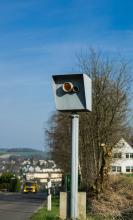A motorist travelling at 149mph (239.8kph) on the M25 at Swanley, Kent, south-east England, holds the record for the highest speed clocked by a speed camera in England and Wales between April 2013 and May 2014.
The astonishing figure was revealed following Freedom of Information (FOI) requests to 39 police authorities by the IAM (Institute of Advanced Motorists).
Other shocking figures from the 85% of police authorities that responded to the FOI request revealed that the highest speed recorded on a 30mph
A motorist travelling at 149mph (239.8kph) on the M25 at Swanley, Kent, south-east England, holds the record for the highest speed clocked by a speed camera in England and Wales between April 2013 and May 2014.
The astonishing figure was revealed following Freedom of Information (FOI) requests to 39 police authorities by the IAM (5125 Institute of Advanced Motorists).
Other shocking figures from the 85% of police authorities that responded to the FOI request revealed that the highest speed recorded on a 30mph (48.28kph) road during the analysed period was 96mph (154.49kph) on the B1288, on Leam Lane, Gateshead, north-east England. The highest speed recorded on a 50mph (80.46kph) road was on the A414 Stanstead Abbotts, Hertfordshire, south-east England, where a motorist clocked 119mph (191.51kph). Meanwhile, the highest speed recorded on a 60mph (96.56kph) road was 127mph (204.38kph) on the A413 Wendover By-Pass, Wendover, Buckinghamshire, south-east England.
IAM chief executive Simon Best said, “One hundred and forty nine miles per hour equates to nearly two and a half miles in a minute. If anything goes wrong at that speed, you’re unlikely to walk away and you are a grave danger to the innocent road users around you.”
“Speed limits are a limit. They are not a target to beat. Unfortunately this message has not got through to many motorists, and it’s clear that efforts to make speeding as socially unacceptable as drink driving continue to fail. That’s why we need sustained campaigning by the government, motor industry and charities to keep ramming home the message that excessive speed kills. Catching speeders at two or even three times the limit also shows the importance of keeping speed cameras at well-known black spots.”
The guidelines to magistrates in England and Wales on sentencing for speeding include issuing a fine plus 6 points or disqualification from driving for 7-56 days if convicted of driving between 101-110mph (162.54kph-177.02kph) on a 70mph (112.65kph) road; of driving at 76-85mph (122.31-136.79kph) on a 50mph (80.46kph) road; or of driving at 51-60mph (82.07-96.56kph) on a 30mph (48.28kph) road.
Best added, “The current guidelines on sentencing for excessive speeding offences are out of sync with modern roads, modern vehicles and society’s view of the value of lives lost in crashes. We all share the roads with these speeding drivers and the government must crack down on them with more consistent penalties and tougher measures to break their addiction for speed.”
The astonishing figure was revealed following Freedom of Information (FOI) requests to 39 police authorities by the IAM (
Other shocking figures from the 85% of police authorities that responded to the FOI request revealed that the highest speed recorded on a 30mph (48.28kph) road during the analysed period was 96mph (154.49kph) on the B1288, on Leam Lane, Gateshead, north-east England. The highest speed recorded on a 50mph (80.46kph) road was on the A414 Stanstead Abbotts, Hertfordshire, south-east England, where a motorist clocked 119mph (191.51kph). Meanwhile, the highest speed recorded on a 60mph (96.56kph) road was 127mph (204.38kph) on the A413 Wendover By-Pass, Wendover, Buckinghamshire, south-east England.
IAM chief executive Simon Best said, “One hundred and forty nine miles per hour equates to nearly two and a half miles in a minute. If anything goes wrong at that speed, you’re unlikely to walk away and you are a grave danger to the innocent road users around you.”
“Speed limits are a limit. They are not a target to beat. Unfortunately this message has not got through to many motorists, and it’s clear that efforts to make speeding as socially unacceptable as drink driving continue to fail. That’s why we need sustained campaigning by the government, motor industry and charities to keep ramming home the message that excessive speed kills. Catching speeders at two or even three times the limit also shows the importance of keeping speed cameras at well-known black spots.”
The guidelines to magistrates in England and Wales on sentencing for speeding include issuing a fine plus 6 points or disqualification from driving for 7-56 days if convicted of driving between 101-110mph (162.54kph-177.02kph) on a 70mph (112.65kph) road; of driving at 76-85mph (122.31-136.79kph) on a 50mph (80.46kph) road; or of driving at 51-60mph (82.07-96.56kph) on a 30mph (48.28kph) road.
Best added, “The current guidelines on sentencing for excessive speeding offences are out of sync with modern roads, modern vehicles and society’s view of the value of lives lost in crashes. We all share the roads with these speeding drivers and the government must crack down on them with more consistent penalties and tougher measures to break their addiction for speed.”





